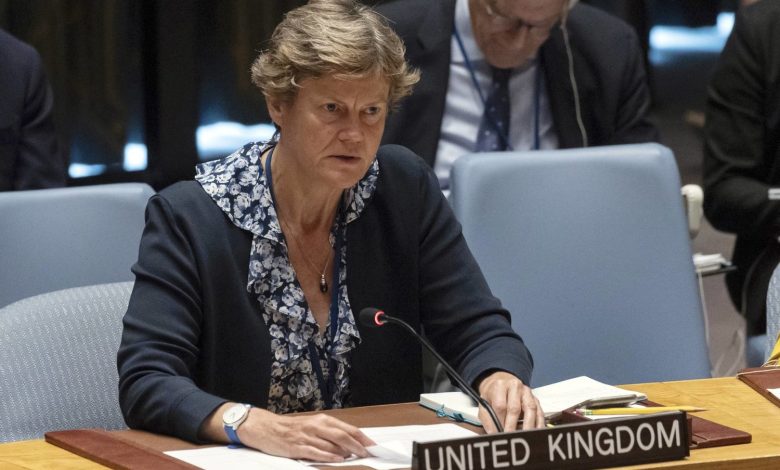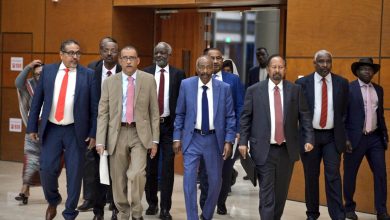Security Council Session.. Britain is under Accusation

Sudan Events – Report
A few hours before the date of holding a session approved by the UN Security Council to discuss the UAE’s military support for the Rapid Support militia (RSF) in the war that broke out in Sudan more than a year ago, the Sudanese mission was surprised by a British intervention that resulted in changing the nature of the session to discuss the situation in Sudan and the city of El Fasher in particular instead of Discussing the UAE aggression against Sudan and taking decisions obligating Abu Dhabi to stop funding the militia with military equipment and stop interfering in the country’s internal affairs. The repercussions of what happened in the Security Council session of British intervention that led to changing the nature of the session prompted the Sudanese Ministry of Foreign Affairs to quickly issue a heated statement.
The origin of the story
At the Security Council meeting last Friday, Sudan submitted a second letter after the first letter of complaint submitted by Sudan against the UAE. The second letter came against the backdrop of a letter from the UAE representative denying their support and sponsorship of the Janjaweed.
In the letter, Sudan confirmed everything it conveyed to the Council in writing or orally, and called on the Council to carry out its responsibilities and hold an urgent meeting of the Security Council to discuss the UAE aggression.
The Sudanese mission then led intensive movements with members of the Security Council until the rotating presidency of the Security Council, currently represented by Malta, was convinced to hold the meeting in the form of a (special meeting). According to the rules of Security Council procedures, special meetings are closed meetings that allow the countries concerned to participate in them if they wish. The Sudanese mission has prepared to participate in it.
Sudan had monitored significant activity resisting the holding of the meeting from the UAE late on the night of Sunday, April 28, and a few hours before the meeting was scheduled to take place at ten in the morning yesterday. Britain sent a message to Malta and other members of the Security Council requesting that the topic of Sudan’s message be postponed due to the arrival of Sudan’s message with… the beginning of the weekend and the absence of an official translation of the letter. The letter added that Britain is pleased, however, to hold the proposed meeting to discuss the Sudanese situation in general. America was quick to support this request, noting that Britain, in accordance with the Security Council’s literature and work rules, considers the country “the penholder.” This is a characteristic that makes it concerned with the files and issues of Sudan in the Security Council, and therefore its opinion on the subject has influence among the Council. In view of this development and in light of the absence of other countries in the Council objecting to the British request due to interactions in the bilateral relations between those countries and the Emirates, Malta decided to continue the meeting on the approach proposed by Britain dominated by the issue of El Fasher, humanitarian access, and foreign interventions fueling the conflict, in general.
It was later revealed that the UAE had exerted intense pressure on Britain to prevent the meeting from taking place in the first place, and the UAE had employed some tools to do so, including canceling joint ministerial meetings, as revealed by The Times newspaper in its issue the day before yesterday.
Informed sources expected the continuation of diplomacy to impose more pressure on the UAE to stop its support for the Janjaweed, especially since the UAE has become very nervous about the exposure of its name by Sudan within the corridors of the Security Council.
It is important to point out that in the history of negative Emirati interventions in countries such as Libya, Yemen and others, no country has subjected them to humiliation in the way that Sudan is currently doing to them. The UAE in general is sensitive to its international image as a haven for trade, investment and financial services, and as a reliable regional and international partner, so harming by the Sudan with that reputation will harm it and benefit Sudan.
The source confirmed that Sudan’s diplomatic efforts will escalate to corner the UAE and hold it responsible for the political and legal consequences of its actions.
Sudanese accusations against Britain
On the other hand, Sudan, represented by the Ministry of Foreign Affairs, issued a strongly worded statement in which it made explicit accusations against Britain.
The Sudanese Ministry of Foreign Affairs criticized Britain’s intervention and changing the nature of the UN Security Council meeting on Monday, which was supposed to be devoted to discussing the UAE’s aggression against Sudan, to become a meeting about the situation in Sudan in general and the El Fasher region in particular.
The Sudanese Foreign Ministry said in a statement on Tuesday, “With reference to the closed consultation session held by the Security Council on Monday on Sudan, according to the Council’s listed agenda, the meeting was supposed to be devoted to the issue of the UAE aggression against Sudan, represented by the multi-faceted sponsorship of the terrorist militia, in light of the speech.” of the Permanent Representative of Sudan to the President of the Security Council on April 26, 2024, in which he requested that an urgent meeting of the Council be held to discuss the matter.
The Foreign Ministry added, “Britain, which proclaims itself the pen-holder in Sudan’s affairs, intervened to change the formats and nature of the meeting, so that it became a meeting about the situation in Sudan in general and the El Fasher region in particular. This coincided with what the British newspaper “The Sunday Times” revealed on April 28, 2024, that the UAE It is putting intense pressure on Britain to protect it in the Security Council, after exposing its role in fueling the war in Sudan with its continued support for the terrorist RSF militia. It stated that the UAE canceled four ministerial meetings with Britain to force it to intervene in confronting the complaint submitted by Sudan.
The statement added, “The closed consultation session was held on Monday morning, during which the members demanded that the militia must stop its hostilities around El Fasher and pledge not to attack any city. They called on the regional parties to adhere to the arms embargo on Darfur in accordance with Resolution 1591. They also called for the resumption of the Jeddah negotiations, and the need to facilitate the arrival of humanitarian aid without obstacles, and with respect for international humanitarian law, the meeting did not come up with any decisions and was satisfied with the statement issued on April 27.”
The Foreign Ministry expressed its regret for Britain’s denial of its moral and political duty as a permanent member of the Security Council and its obligation to address Sudan’s issues in the Council, and by virtue of its colonial past in Sudan, the bad effects of which are still continuing, in exchange for its commercial interests with the UAE.
The Foreign Ministry said, “Britain’s protection of the largest financiers of the war in Sudan, coupled with what was revealed by the British press that the British government held secret meetings with the RSF militia, which met all the characteristics of terrorist groups, makes it a partner in responsibility for the atrocities committed by the terrorist militia and its sponsor, and a supporter of escaping terrorism punishment.”
The statement added, “This shameful step by Britain, and the leniency shown by the Western countries, permanent members of the Council, towards the atrocities of the militia and its sponsor, the UAE, will not deter Sudan from using all ways and means to protect its people, sovereignty and dignity. The credibility of the Security Council and its ability to carry out its role in protecting peace and security remains intact.” The international community and loyalty to the principles and ideals of the United Nations Charter are constantly being tested. We hope that the efforts of the members of the Council who believe in justice, peaceful coexistence and respect for the sovereignty of states will combine to pass it successfully.”
Closed session
The UN Security Council held a special closed session on Monday to discuss the escalation of military operations in El Fasher.
The session was scheduled at the request of the Sudanese mission in New York to discuss the UAE aggression against Sudan, but British intervention, through exposure to Emirati pressure, changed the course of the session to discuss the situation in El Fasher.
Council members expressed concern about this escalation and its dangers to hundreds of thousands of civilians, including those displaced from other regions and the indigenous residents of El Fasher.
Weapon supplies
The US Ambassador to the United Nations, Linda Thomas-Greenfield, presented several proposals to stop this escalation, including halting arms supplies provided by foreign countries to the parties to the conflict, including the United Arab Emirates.
In statements after the end of the special session, the American ambassador warned of what she described as a massacre in El Fasher, and added, “The Security Council met on Monday to discuss the crisis in El Fasher, in which a large-scale massacre is about to occur. This is not an analysis of the situation, but rather a grim reality facing millions of people.” .
She said, “There are already reliable reports that the RSF and their allied militias have raided a number of villages west of El Fasher. Currently, the RSF are planning an imminent attack on El Fasher. As I said previously, history is repeating itself in Darfur in a way “Extremely tragic, and any attack on El Fasher would be a disaster upon a disaster, as it would put 500,000 internally displaced people at risk, people displaced from all over the region in search of safe haven. Added to these are two million Sudanese who consider El Fasher their home. A crisis of terrible proportions is looming on the horizon.” .
She added, “In order to avoid death, destruction and suffering, there are five things that must be done immediately, the first of which is the RSF ending their siege of El Fasher and stopping strengthening their military capabilities in the region, and the second is
All parties to the conflict take urgent steps to reduce the escalation. The UN Security Council has already called for this, but this is not enough. Every member state must speak out, and the entire international community must speak out.”
She stressed the need for the armed parties fighting in Sudan to respect international law and protect civilians, and to take into account the jurisdiction of the International Criminal Court to investigate war crimes, and urged all regional powers to stop providing weapons to both sides, in accordance with the arms embargo imposed by the United Nations.
The warring parties demanded that they enter into direct negotiations in Jeddah, because this conflict will not be resolved on the battlefield, but rather will be resolved at the negotiating table. All parties must allow full, rapid, safe and unhindered access for humanitarian aid, including access via seaports and air lines. There are currently 5 million people in Sudan on the brink of famine, and tens of millions of people are in desperate need of aid. However, the warring parties continue to obstruct humanitarian access and deny access to media representatives.
The US Ambassador to the United Nations, Linda Thomas-Greenfield, urged the media to help the Sudanese avoid massacres in El Fasher.
In response to a question about the importance of the discussion that took place during the session with the member states that are believed to be supplying the warring parties with weapons, including the UAE, she stressed the importance of stopping supplying the parties to the conflict with weapons in compliance with Security Council resolutions in this regard.
She said, “This is very important, because we know that the militia is receiving support, whether with weapons or other types of support, to fuel their efforts to continue to destroy Sudan. We have communicated with parties in this, including our counterparts from the United Arab Emirates.”
Imminent danger
For his part, the British Ambassador to the United Nations, James Kariuki, expressed concern about the humanitarian crisis, the imminent threat of famine, and the obstacles placed in front of relief convoys. He said in statements after the closed session that the attack on El Fasher represents an imminent danger to civilians in the city, and he added, “The Council expressed during its closed session expressing its concern about the humanitarian crisis, it also expresses its concern about the scale of the risks of famine and population displacement. We learned in particular how serious the problem of humanitarian access is given the obstacles imposed by both sides of the conflict on humanitarian access, and the strengthening of military capabilities around El Fasher. The Council was united in the discussion. In our statement issued over the weekend about our concern about the potential escalation of the situation there and the imminent danger threatening the hundreds of thousands of people in El Fasher who have taken refuge there, many of whom have come from other camps for internally displaced persons. As you know, the last thing Sudan needs is an escalation of the conflict that has been ongoing throughout the past year. The Council is concerned about the humanitarian situation and concerned about the risks of famine and population displacement. We hear about how obstacles are being placed in front of relief convoys that both sides are putting in place. So what do we need to do, what we need to see, and what we have been clear about is that we need to see a reduction in escalation, and we need “We need to see humanitarian aid arrive, and we need to see both sides return to political talks in Jeddah.”
The Permanent Mission of Sudan to the United Nations had called on the Council to put an end to the UAE’s support for the RSF Militia with weapons.
Cancel meetings
The Security Council session was preceded by news published by the British newspaper The Times, stating that the United Arab Emirates canceled meetings with British ministers, against the backdrop of its accusation of financing the Rapid Support militia.
According to the British newspaper The Times, four ministerial meetings with Britain were canceled by the Emiratis, as a result of their anger at the position of Britain, which did not come to defend the UAE in the Security Council “



